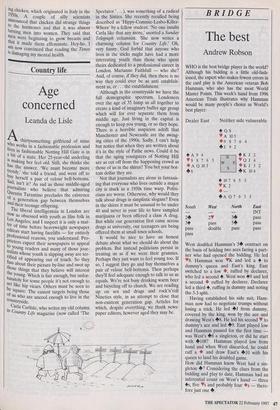Country life
Age concerned
Leanda de Lisle
Athirtysomething girlfriend of mine who works in a fashionable profession and lives in fashionable Notting Hill Gate is in a. bit of a state. Her 25-year-old underling is making her feel old. Still, she thinks she has the answer. 'We must become more trendy,' she told a friend, and went off to buy herself a pair of velour bell-bottoms. Sad, isn't it? As sad as those middle-aged Journalists who believe that admiring Quentin Tarantino precludes the existence Of a generation gap between themselves and their teenage offspring. The liberal intelligentsia in London are now as obsessed with youth as film folk in LOS Angeles, and I suspect it is only a mat- ter of time before heavyweight newspaper editors start having facelifts — for entirely professional reasons, you understand. Pro- prietors expect their newspapers to appeal to young readers and many of those jour- nalists whose youth is slipping away are ter- rified of appearing out of touch. So they hiss about their picture by-line and swot up those things that they believe will interest the youn-. g Which is fair enough, but unfor- tunately for some people it's not enough to be like hip vicars. Others must be seen to De square. The easiest targets being those of us who are uncool enough to live in the countryside. Carla Carlisle, who writes my old column In Country Life magazine (now called 'The Spectator ' ...), was something of a radical in the Sixties. She recently recalled being described as 'Hippy-Commie-Lesbo-Killer- Whore' by a fellow student. 'No one insults Carla like that any more,' snorted a Sunday Telegraph columnist. 'She now writes a charming column for Country Life.' Oh, very funny. God forbid that anyone who lives in the sticks might have had a more interesting youth than those who spent theirs dedicated to a professional career in London. Marianne Faithful' — who she? And, of course, if they did, then there is no way they could ever be as anti establish- ment as, er . the establishment.
Although in the countryside we have the full demographic spectrum, Londoners over the age of 35 lump us all together to create a kind of imaginary buffer age group which will for ever separate them from middle age. Just living in the capital is enough to keep you young, or so they hope. There is a horrible suspicion adrift that Manchester and Newcastle are the swing- ing cities of the 1990s. Sadly, I can't help but notice that when they are written about it's in the style of Pathe news. Could it be that the aging youngsters of Notting Hill are as cut off from the happening crowd as those of us in the shires? You bet your bot- tom dollar they are.
Not that journalists are alone in fantasis- ing that everyone who lives outside a major city is stuck in a 1950s time warp. Politi- cians are worse. Otherwise, why would they talk about drugs in simplistic slogans? Even in the shires it must be unusual to be under 40 and never in your life to have sampled marijuana or been offered a class A drug. But while our generation first came across drugs at university, our teenagers are being offered them at small town schools.
It would be nice to have an honest debate about what we should do about the problem. But instead politicians persist in treating us as if we were their grannies. Perhaps they just want to feel young too. If so, I suggest they go and buy themselves a pair of velour bell-bottoms. Then perhaps they'll feel adequate enough to talk to us as equals. We're not busy drinking warm beer and bicycling off to church. We are reading up on sex and drugs and rock'n'roll Nineties style, in an attempt to close that non-existent generation gap. Articles for which, despite everything, we thank news- paper editors, however aged they may be.


























































 Previous page
Previous page